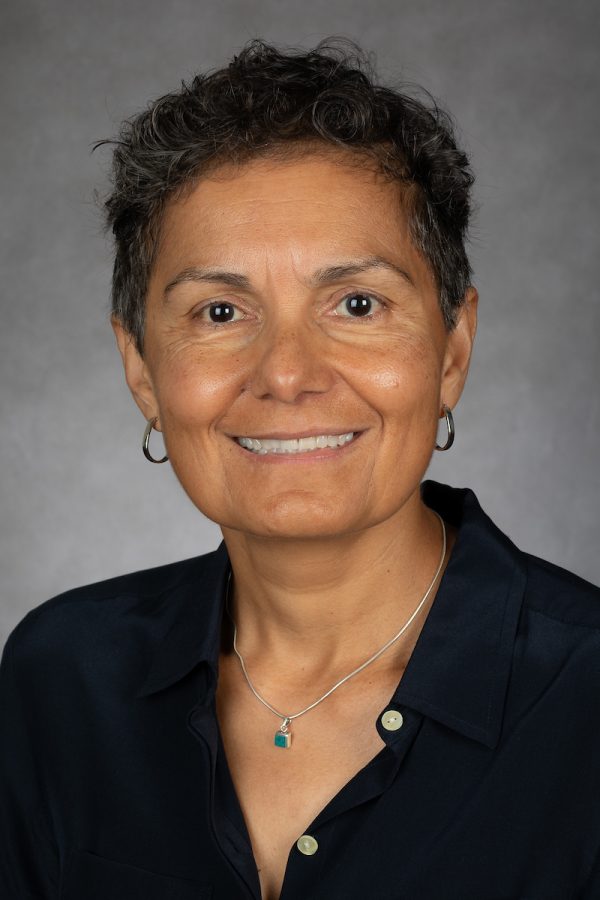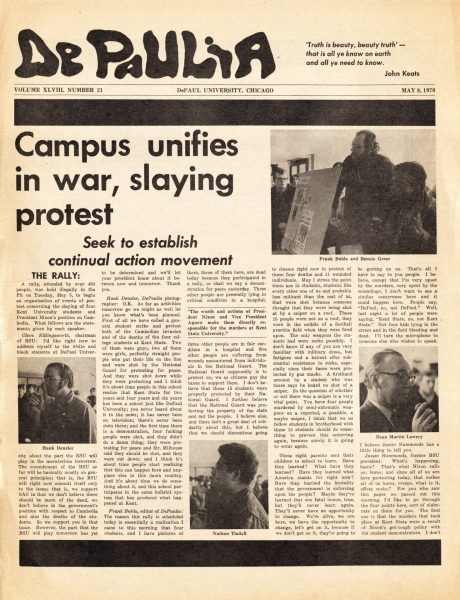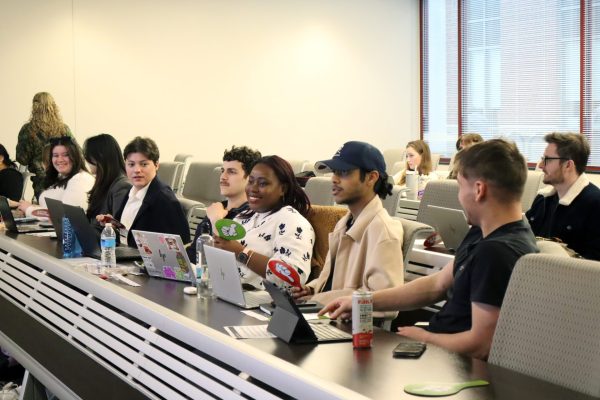DePaul professor honored with Frank Bonilla award
DePaul University / Jeff Carrion
Lourdes Torres, Professor, Latin American and Latino Studies, College of Liberal Arts and Social Sciences, DePaul University, is pictured Sept. 13, 2018. (DePaul University/Jeff Carrion)
Lourdes Torres, a professor of Latin American and Latino Studies at DePaul, has been named a recipient of the 2021 Frank Bonilla Public Intellectual Award.
The Frank Bonilla Public Intellectual Award pays tribute to the innovative legacy of the late Frank Bonilla, writer and advocate for collaborative research with other scholars of Latin America and Latino studies.
“I was very honored and happy to know that my colleagues thought enough of me to nominate me for the award and then to select me,” Torres said. “Being recognized with this award really makes me feel good when people notice your work and feel like it has an impact on them.”
Torres said sometimes it feels like she’s toiling with the research and it makes her proud because the work is getting done but it’s nice when people recognize the work.
“I’m gratified by that, it’s an honor,” Torres said.
The honor was granted by the Latina/o Studies Section of the Latin American Studies Association, a national association for individuals and institutions involved in the study of Latin America. According to Newsline the award recognizes her leadership as an “anchor of Latinx studies in the Midwest and beyond.”
“[Bonilla] is my idea of an activist scholar, somebody whose work is geared towards creating social change and creating a world we want to see, not the world we live in,” Torres said.
Similar to Bonilla’s legacy, Torres feels that her work is closely related to Bonilla’s work as a scholar.
Bonilla mentored students and emerging faculty in Latino studies and was interested in making sure that research projects would engage and have an impact in marginalized communities.
“It’s not research for the sake of it, but research that has something to say and has something to contribute to discussions that are important to have,” Torres said.
Torres research focuses on Latinx queer organizations in Chicago. Through her research she found that there is very little research that exist in queer organizing, specifically in the east and west coast of the United States. Existing research is less focused on people of color and even less on LGBTQ women.
“I wanted to contribute with literature because I think it’s important for people to recognize that we are here, we’ve been here, and we’re contributing to our Latino and LGBTQ community,” Torres said.
Torres recognizes and appreciates DePaul’s role in her career. “DePaul gave me the opportunity to work on the Latin American studies/Latino studies program which grew to a department,” Torres said. “DePaul’s support of the Latin America and Latino studies department recognizes that Latino’s matter and our histories and our stories matter.
She is the editor-in-chief of the Latino Studies Journal, a publication that writes about Latinos social, cultural and political issues they face both in the United States and internationally.
“I feel privileged to help scholars put their work out and in a venue that is highly read and available in libraries that get the stories of Latinos out there,” she said. “…Not all institutions will support all that work therefore I am very grateful that DePaul has been really supportive of the journal and the department.”
Marisa Alicea, a professor in the School of Continuing and Professional Studies works closely with Torres as associate editor of the Latino Studies Journal.
Alicea meets with Torres to review articles but during the work Torres makes it fun and at the same time she’s vigorous and thoughtful. “She has a great sense of humour,” Alicea said.
“[Torres] has a commitment to equity and inclusion,” she said. She’s inclusive of others and welcomes diverse perspectives in the journal.”
The research Torres engages with is Latino and lesbian organizing, along with bilingualism and Spanish in the United States. The work is important to her because it highlights populations that are marginalized.
“We are a diverse community,” Alicea said. “Her work on LGBTQ studies in respect to Latina lesbians both in Latin America and here in the U.S highlights the diversity in our community…I am pleased to see how it shines light on the good work of the department, the university, and most importantly the work she put in.”
Students play a huge role in Torres’ work. Her students keep her on her feet with ideas that turn into possible research.
“To be a better researcher I have to be a better teacher and vice versa,” she said.
Torres has a better sense of what is happening in Latino communities because she teaches Latin American/Latino studies and many of her students are Latinos.
“I’m in conversation with folks who are impacted first hand,” Torres said.
Karla Velasco, a DePaul graduate, said that during her first year at the university, she felt like she didn’t fit in with other students. She said that Torres was a great advisor that kept her interested in her independent research.
“Her availability outside of the classroom was helpful,” Velasco said. “She was very open to talk with students, it wasn’t intimidating to ask for questions.”
After taking Torres class Velasco said that Torres continued to help her with her educational goals. Velasco says Torres inspired and motivated her to pursue a PhD.
“I can not speak enough for what she has done for me and for the communities she works with,” Velasco said. “She definitely deserves that award no doubt about it.”












